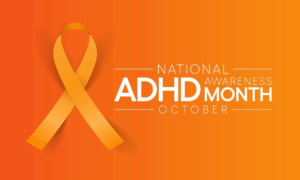ADHD Awareness Month: Psychiatry’s Impact
October is recognized as ADHD Awareness Month, a time to highlight the realities of Attention-Deficit/Hyperactivity Disorder and the important role psychiatry plays in helping individuals thrive. ADHD is one of the most common neurodevelopmental conditions, but it is also often misunderstood. By raising awareness, we can reduce stigma, encourage early diagnosis, and support children and adults living with ADHD.
individuals thrive. ADHD is one of the most common neurodevelopmental conditions, but it is also often misunderstood. By raising awareness, we can reduce stigma, encourage early diagnosis, and support children and adults living with ADHD.
What Is ADHD?
ADHD is a condition that affects attention, focus, and impulse control. While it is often associated with children, many adults live with ADHD as well. Symptoms can look different depending on age, gender, and individual circumstances, which is why psychiatry is so important in the evaluation and treatment process.
Some common symptoms include:
- Difficulty focusing or staying organized
- Forgetfulness or losing track of tasks
- Impulsivity or acting without thinking
- Restlessness or hyperactivity
ADHD in Children and Adults: The Data
Recent research provides a clearer picture of ADHD in the United States. According to the CDC:
- Children: About 7 million children aged 3–17 (11.4%) have been diagnosed with ADHD, with boys more likely to be diagnosed than girls.
- Adults: Around 15.5 million adults (6.0%) currently have an ADHD diagnosis, and more than half were diagnosed in adulthood.
- Gender differences: About 13.3% of boys versus 7.5% of girls have current ADHD diagnoses. In adulthood, women are less often diagnosed, though awareness is increasing.
These numbers remind us that ADHD is not just a childhood condition. It affects people across the lifespan.
How Is ADHD Treated?
Psychiatry plays a central role in diagnosing and managing ADHD. Treatment is often most effective when it is individualized, addressing each person’s unique challenges and strengths. Common approaches include:
- Medication: Stimulants and non-stimulant medications can help improve focus, reduce impulsivity, and manage symptoms.
- Behavioral therapy: Strategies that build organization, planning, and coping skills are especially helpful for children and adults.
- Psychiatric care: Ongoing evaluation by a psychiatrist ensures that treatment remains effective and adjusted to life’s changing needs.
- Supportive therapies: Counseling, coaching, and family education can make a meaningful difference.
Raising Awareness and Reducing Stigma
ADHD is often misunderstood, leading to stigma or feelings of shame. Awareness campaigns like ADHD Awareness Month remind us that ADHD is a medical condition, not a character flaw. Here are some ways to promote understanding:
- Share reliable information and resources about ADHD.
- Encourage open conversations within families, schools, and workplaces.
- Recognize and celebrate the strengths that often come with ADHD, such as creativity and problem-solving.
- Support individuals by advocating for accessible psychiatric and behavioral health care.
Moving Forward Together
ADHD Awareness Month is an opportunity to reflect on how far we’ve come in understanding ADHD and to acknowledge the work still ahead. Psychiatry provides the tools, treatments, and compassionate care needed to help people of all ages manage ADHD effectively. By continuing to raise awareness and break down stigma, we can create a more supportive environment for everyone living with ADHD.